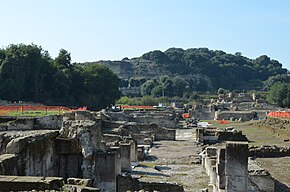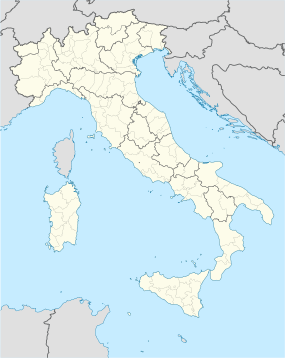Diocese of Cuma (Italy)
| Κύμη / Κύμαι / Κύμα Cuma |
|

The acropolis of Cumae seen from the lower city.
|
|
| Location | Cuma, Province of Naples, Campania, Italy |
|---|---|
| Region | Magna Graecia |
| Coordinates | 40°50′55″N 14°3′13″E / 40.84861°N 14.05361°ECoordinates: 40°50′55″N 14°3′13″E / 40.84861°N 14.05361°E |
| Type | Settlement |
| History | |
| Builder | Colonists from Euboea |
| Founded | 8th century BC |
| Abandoned | 1207 AD |
| Periods | Archaic Greek to High Medieval |
| Associated with | Cumaean Sibyl, Gaius Blossius |
| Events | Battle of Cumae |
| Site notes | |
| Management | Direzione Regionale per i Beni Culturali e Paesaggistici della Campania |
| Website | Sito Archeologico di Cuma (in Italian) |
Cumae (Ancient Greek: Κύμη, translit. (Kumē) or Κύμαι (Kumai) or Κύμα (Kuma);Italian: Cuma) was an ancient city of Magna Graecia on the coast of the Tyrrhenian Sea. Founded by settlers from Euboea in the 8th century BC, Cumae was the first Greek colony on the mainland of Italy and the seat of the Cumaean Sibyl. The ruins of the city lie near the modern village of Cuma, a frazione of the comune Bacoli in the Province of Naples, Campania, Italy.
The settlement, in a location that was already occupied, is believed to have been founded in the 8th century BC by Euboean Greeks, originally from the cities of Eretria and Chalcis in Euboea, which was accounted its mother-city by agreement among the first settlers. They were already established at Pithecusae (modern Ischia); they were led by the paired oecists (colonizers) Megasthenes of Chalcis and Hippocles of Cyme.
The Greeks were planted upon the earlier dwellings of indigenous, Iron Age peoples whom they supplanted; a memory of them was preserved as cave-dwellers named Cimmerians, among whom there was already an oracular tradition. Its name refers to the peninsula of Cyme in Euboea. The colony was also the entry point in the Italian peninsula for the Euboean alphabet, the local variant of the Greek alphabet used by its colonists, a variant of which was adapted and modified by the Etruscans and then by the Romans and became the Latin alphabet still used worldwide today.
...
Wikipedia

